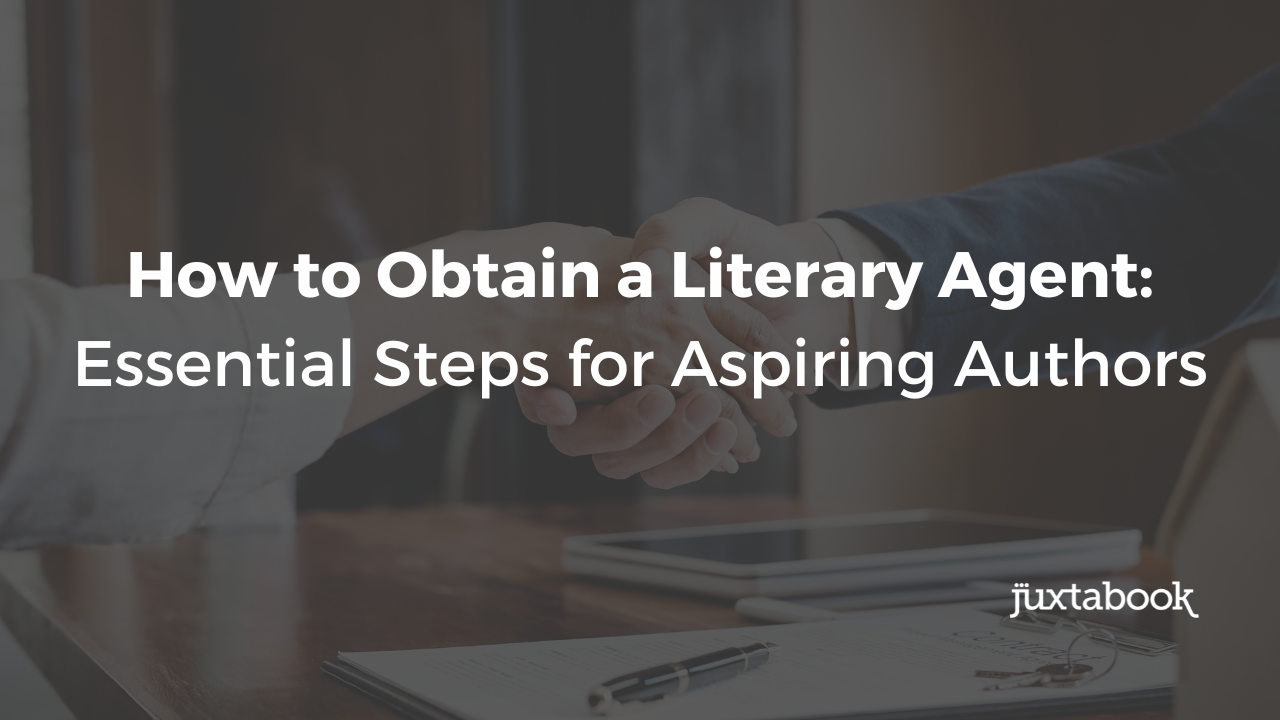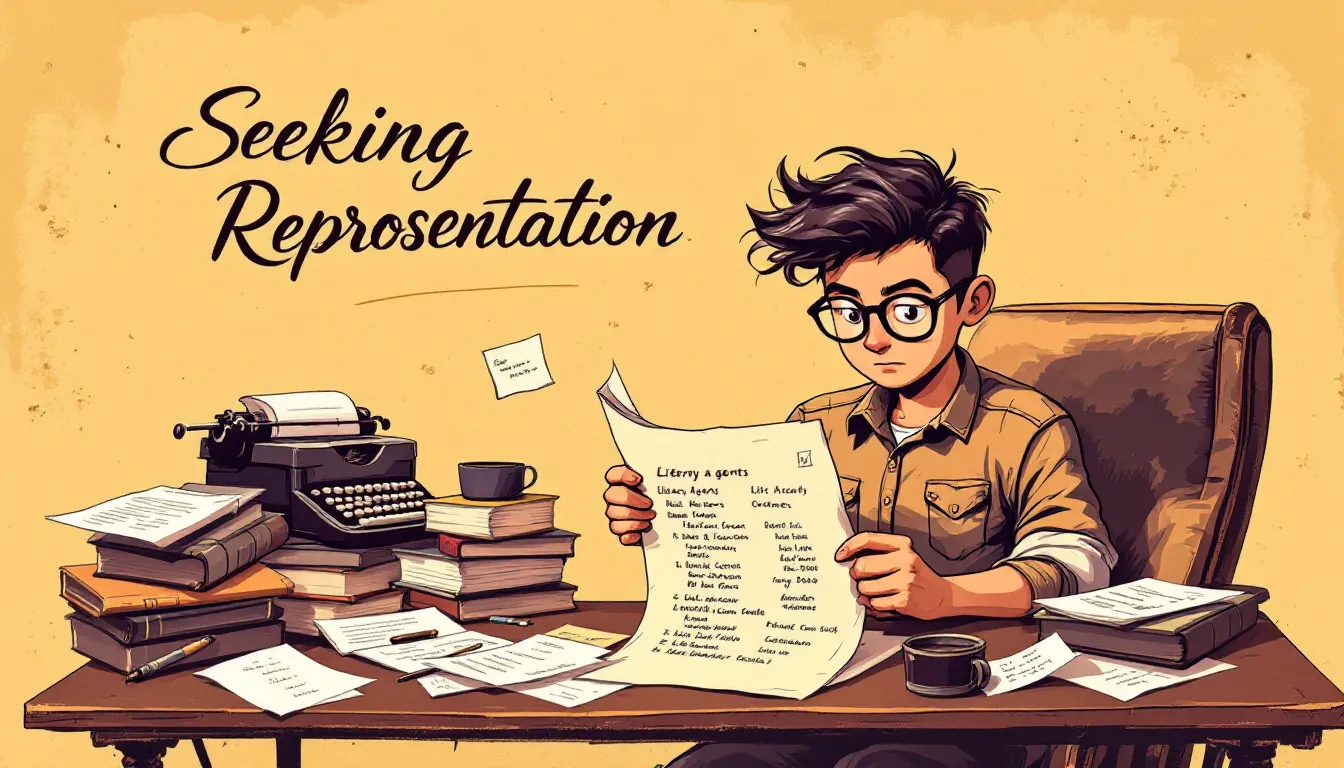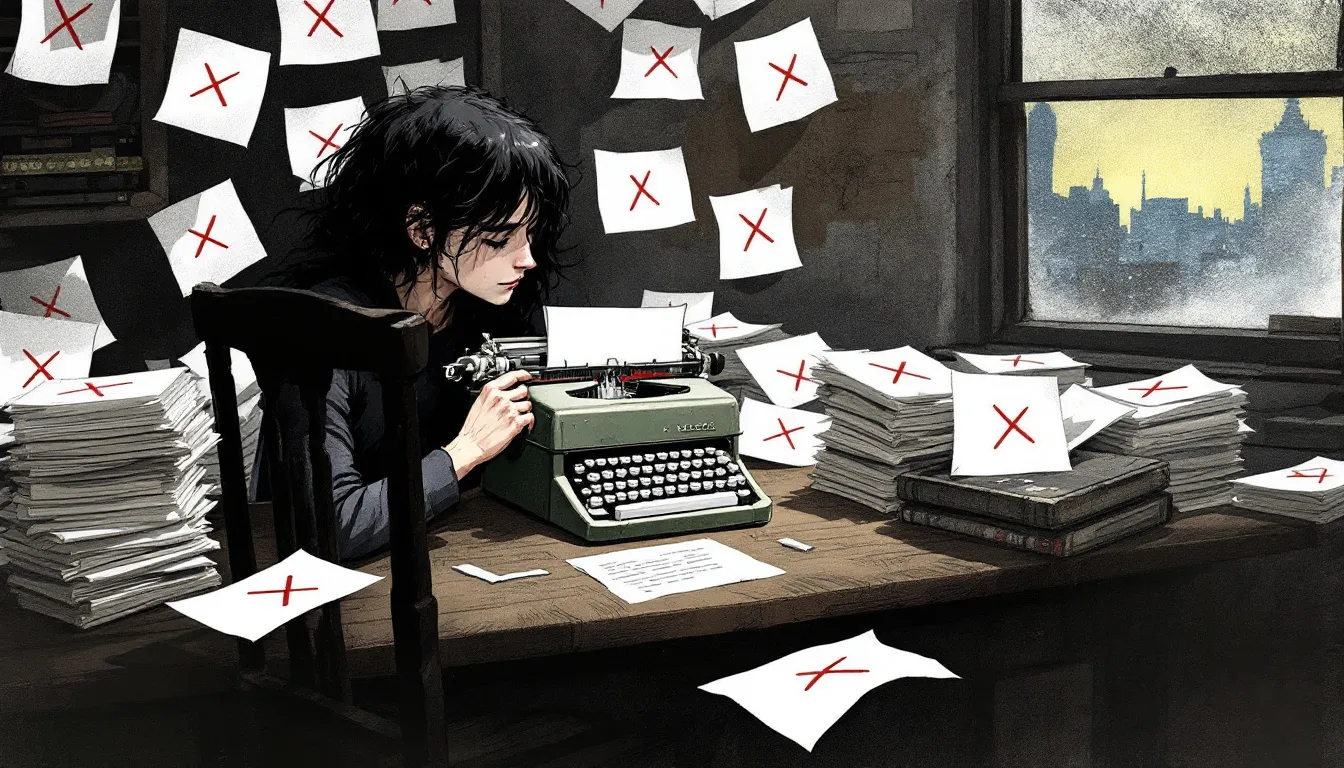How to Obtain a Literary Agent: Essential Steps for Aspiring Authors
May 08, 2025
How to Obtain a Literary Agent: A Practical Guide for Aspiring Authors
Want to know how to obtain a literary agent? This simple guide will explain what an agent does and how to find one. We'll review all the steps you need to know from the agent search process to query letters to submitting your manuscript. Follow these tips to increase your chances of finding the right agent.
Key Points
-
Understanding what a literary agent does is key as they advocate for authors and improve your manuscript’s marketability.
-
Knowing your book’s genre and doing your research on potential agents increases your chances of finding the right one.
-
Submitting personalized queries in batches and expect that there will be rejections.
Understand the Role of a Literary Agent
Before you start looking for one, you need to know what makes a good literary agent fit for you. These agents handle the commercial side of traditional publishing, champion authors by pitching their work to editors. They are your advocate in negotiations, making sure you get paid for your writing.
Working with a reputable literary agency can increase your chances of success as they offer structured support and industry connections to secure book deals.
These agents mitigate publishers’ financial risks and secure book deals. Their market analysis forecasts potential sales and involves having strong connections with editorial teams and influencers at various publishing houses across the literary world – connections that often prove crucial in getting your manuscript noticed.
Literary agents look for not just great writing but marketability – they know how to spot talented writers and improve prospects within literary fiction. A good literary agent navigates you through the territory between the agency structure and the broader publishing industry.
Do You Need a Literary Agent
First, decide if you need a literary agent. In traditional publishing, most agents are essential as most big publishers don’t accept unsolicited submissions. Without an agent, getting a traditional publishing deal is very hard.When self-publishing, you have more creative control and keep more of the profits from book sales. But it comes with its own challenges. For example, getting a literary agent may become harder once you’ve self-published.
Think about what you want to achieve with your publication and take stock of your resources. Do you want to be in bookstore displays? Then getting a literary agent should be part of your strategy. Or do you want to be in control of the process and bear more responsibility – then self-publishing might be the way to go.
Identify Your Book's Genre and Market Position
Determining your book’s genre is part of the publishing process. It helps you connect with readers who are interested in that genre and how agents view your work. Getting your genre wrong can mean marketing to the wrong audience and that can harm your success.
When formulating your strategy towards literary agents and creating a book proposal, you need to identify comparable titles for market placement purposes. If your book has elements from multiple genres, use multiple descriptors; “historical science fiction” might be a better description of your manuscript than just “science fiction”.
A solid understanding of both the specifics of your genre and where it sits in the market will lead you to agents who have experience with similar content types. That synergy often means they’ll be more enthusiastic about your project.
Writing a Wonderful Book
Writing a great book is the first step in attracting a literary agent. A well-written, engaging manuscript with a clear structure is essential. To achieve this you need to understand your genre and audience. Research your genre and read widely to get insight into what makes a book successful in your category.
A great book should have a clear plot, well-developed characters and a strong narrative voice. Editing and revising your work is crucial to make it the best it can be. Get feedback from beta readers and professional editors to identify areas for improvement. A polished, error-free manuscript stands out and increases your chances of getting an agent’s interest.
Preparing Your Manuscript for Submission
A well-submitted manuscript is formatted correctly and error-free. Be mindful that each agency has specific submission guidelines. Take the time to reserach that your manuscript meets their specific requirements.
Your full submission package should include a query letter, synopsis and sample chapters. The query letter introduces your book and highlights its unique features. The synopsis is a brief summary of your book’s plot and characters, while the sample chapters showcase your writing style and voice. A professional and polished manuscript increases your chances of getting representation from a literary agent.
Find Potential Agents

Start by finding the right literary agent who specializes in your genre and understands the market you’re targeting. Resources like Publishers Marketplace and Manuscript Wish List can help you find agents who represent your category. Platforms like QueryTracker are also useful tools to organize submissions and track responses.
To find potential agents, look in the acknowledgment section of books similar to yours or browse agency websites that showcase the types of projects they’re looking for. Profiles on the Manuscript Wish List give you insight into what specific agents want and whether they’re open to new material, helping you find the right partner. The Reedsy Directory has information on different literary agents including their genre preferences.
Keep a large list – around 50-60 names – when considering agents for your roster. This broad approach increases your chances of getting an agent in a competitive market. The more extensive the search the more important it is to query multiple prospects to increase your chances of finding your dream agent.
Create a Targeted Shortlist of Agents

Selecting a shortlist of agents that fit genre, tone, theme and style of your book manuscript. You may find several strong prospects buy you also need to research an agent’s sales record and their affiliation with your genre to chedk if they would be a good fit.
It’s recommended to target around 25-50 agents during your search. Contacting more than one agent at a time can increase the chance of rejections given their busy schedules. Resources like the Manuscript Wish List can help you find agents for your needs.
Use a spreadsheet to keep track of the researched agents. Organize them by how well they match your manuscript and whether you’d like to work with them. This focused approach will help you stay organized and focused during the query process.
Research Each Agent Thoroughly
Research is key to avoiding literary agents who may not be reliable. Make sure to verify each agent you’re considering by looking into their sales record and what their authors have said about them. Use a tool like Publisher’s Marketplace to see what an agent has sold.
Resources like Writer’s Digest and Manuscript Wish List are great for digging deeper into information about various literary agents. By looking at the websites and professional profiles of these agents you can see who they represent and assess whether your manuscript fits their preferences and minimize competition with similar works.
Community-driven platforms like QueryTracker and Reddit forums may reveal personal anecdotes about how different literary agents respond to queries. Before sending out query letters make sure these query agents are open to new submissions. They may stop accepting queries when overwhelmed with existing work. These strategies will help you find the right literary agent for your publishing goals.
Prepare Your Query Package
Make a strong first impression with your initial submission by crafting a good query package. A good query letter is brief, usually one page or 200-450 words. In your bio section highlight any relevant writing credentials and experiences that add authority to your profile.
Don’t discuss personal hardships or how long it took you to write in your query. Your goal is to captivate literary agents by highlighting the intrigue of your story. Showing awareness of market trends by mentioning books similar to yours can show where your work fits in the current market.
Before submitting make sure your manuscript is complete and polished. Adhere to submission guidelines. Format manuscripts correctly, error-free content and paginate. A well-prepared query package increases your chances of getting representation from a literary agent. Getting a book deal often depends on the strength of your manuscript and your understanding of its commercial appeal.
Send Personalized Query Letters

Taking the time to customize your query letters for each agent shows you’ve done your research, respect their specific tastes and professional history. Make sure you address each letter to the right agent and follow their agency’s instructions. Your submission becomes more persuasive when you include reasons why a certain agent is being asked.Research can give you special information to craft personalized queries and make them more powerful. Personalized queries get an average 58% response rate, so this strategy really works in making your query stand out from the many others agents receive.
Submit Queries in Batches
Sending out groups of 15 queries can increase your chances of getting an agent. Keep an eye on the responses from agents. If there are no requests for partials after 6 weeks, this could mean problems with your query letter. Wait until you get feedback from your first batch before submitting again.
Sending out queries and then modifying them based on the responses received helps to boost your chances of getting representation. During this phase of the submissions process, be patient and determined.
Handle Responses and Rejections

Rejections are a part of the journey to success. Every published author has experienced them at some point. You’ll get generic, polite letters declining your submission but personalized feedback that discusses your submission’s pros and cons means the agent has really read it.
Take in the constructive criticism and respond to them with gratitude. If after 12 agents you get nothing but rejections or no response at all, it might be time to reflect on your book’s concept or written execution. At this point consider getting professional advice or starting anew with a different manuscript.
If there’s no response from agents within 6 weeks of submission, don’t hesitate to follow up politely asking for an update. Don’t interpret lack of response as rejection because although “silence is the new no” is often heard in publishing circles, silence doesn’t always mean no.
Meeting Agents and Industry Professionals
Meeting agents and industry professionals can be a great way to learn more about the industry. Attend writing conferences and events to meet agents and editors in person. Research agents and their client lists to find potential agents to connect with.Prepare an elevator pitch and query letter to make an impact. Be professional and respectful when meeting agents and industry professionals. Ask questions and seek feedback to gain insight into the industry. Building relationships with agents and industry professionals will keep you informed and find the right agent for your book.
Evaluate Offers Carefully
When you get multiple offers, evaluate the agents’ level of enthusiasm for your manuscript. Understand each agent’s approach to marketing your book to make an informed decision. Confirm the agent’s vision for your work matches your long-term career goals, as this is key to a successful partnership.
Regardless of whether you accept or decline, respond to all agents who have shown interest in representing you promptly. Be professional in these interactions to leave a good impression and keep options open.
What to Expect from a New Agent
Working with a new agent can be exciting and intimidating. A new agent will typically start by reviewing your manuscript and giving feedback. They may suggest revisions or edits to make your book more appealing. Your agent will also start researching publishers and submitting your work.
They will negotiate contracts and advocate for you, providing guidance and support throughout the process. Building a good relationship with your agent will help keep their attention on giving your book the best chance possible at landing a deal.
A Successful Partnership
A successful partnership with your agent is key to long-term success. Communication is key; be open and honest with your agent to build trust. A successful partnership is built on mutual respect and understanding. Your agent should know the industry and be able to offer valuable advice.
A collaborative and supportive relationship will benefit both of you. Your agent should give you feedback and suggestions to improve your work. Together you can navigate the industry and work towards a career.
Avoid Burnout During the Process
It’s important to avoid burnout which can come with the querying process. To reduce stress and keep your creative juices flowing, start new writing projects. Celebrate small victories. Enjoy getting requests for manuscripts or customized feedback to keep momentum going.Set achievable goals for your writing to manage your tasks without burning out. Writing multiple projects can keep you interested and reduce stress. Being part of a community of fellow writers can give you the support you need and reduce the feeling of isolation that comes with the querying process.
Summary
To get a literary agent you need to understand their role, decide if you need them, identify the category of your manuscript and research and investigate potential agents. Crafting a query package is important as well as being polite in your responses. This requires attention to detail, perseverance and planning.
Remember publication is a marathon not a sprint. Keep going. Keep improving how you present your work and don’t let rejections stop you from pursuing this goal. The right literary agent for you is out there – they just haven’t read your book yet.
Frequently Asked Questions
Do I really need a literary agent to get published?
Yes, if you’re looking to publish through a major publisher, you definitely need a literary agent since they typically don’t accept unsolicited manuscripts.
An agent can really help you navigate the publishing world.
Can I approach more than one agent at a time?
Absolutely! Approaching multiple agents can significantly boost your chances of getting representation, so aim to connect with 25-100 agents during your search.
How do I handle rejections from agents?
Rejections are totally normal, so don’t take them personally.
Use any feedback to improve your manuscript and keep pushing forward with your submissions!
What should I include in my query letter?
A query letter should include a concise, one-page synopsis of your book, a brief bio with your relevant credentials, and a few comparable titles to show your market understanding.
This helps agents see the potential of your work right away!
How can I avoid burnout during the querying process?
To avoid burnout during the querying process, focus on starting new writing projects and celebrating small wins, while also setting realistic goals and maintaining a supportive writing community.
Balancing multiple projects can help keep your motivation up and stress levels down.
Stuck Knowing How to Publish Your Book?
Take the quiz to Discover the Ideal Book Publishing Path for You


